If you’re just dipping your toes into surfing or seeking a smoother learning journey, these surfing tips for beginners are just what you need.
As a beginner, it’s important to approach surfing with a blend of excitement and respect for the water.
Starting with the right equipment is crucial; a stable, buoyant surfboard, typically a soft-top or foam board, will aid in your balance and flotation.
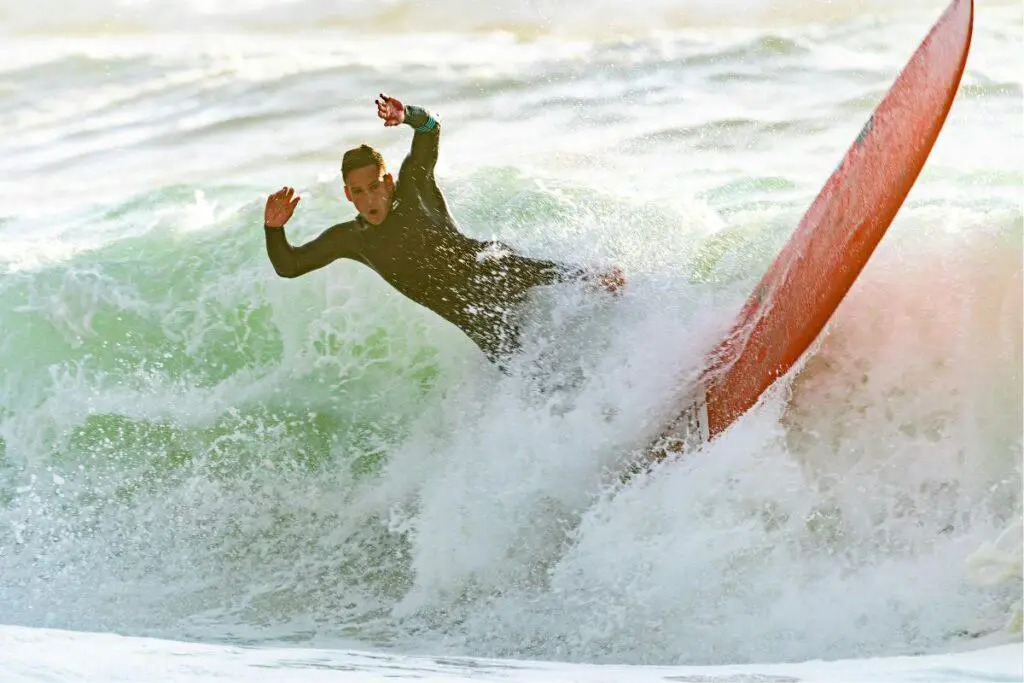
Always secure a leash to your ankle and the other end to your board, ensuring your safety and that of others around you.
🏄 Before venturing into the waves, familiarize yourself with the ocean conditions. Opt for beaches that are known to be beginner-friendly, where smaller, more manageable waves will allow you to hone your skills without being overwhelmed.
It’s essential to learn how to read a surf forecast, understanding tides and timing, to maximize your experiences.
Embracing this new adventure should be as much about fun as it is about the learning process. By knowing your environment and having the appropriate gear, you’ll set yourself on a path to mastering the basics of surfing.
Top 5 Critical Surfing Tips for Beginners!
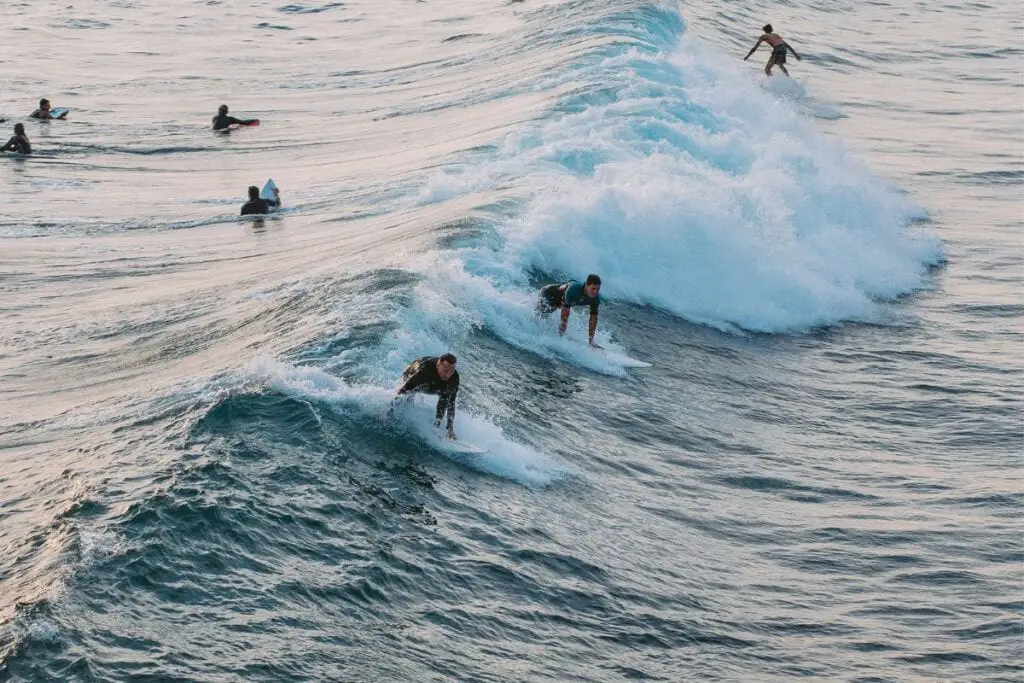
So you’ve decided you want to learn to surf? I mean really learn to surf? The first thing you might be thinking is “I need to find the right surfboard, which one is best?” but you might be jumping the gun a bit.
Here are the top 5 KEY surfing tips for beginners to consider when thinking about learning to surf that will help you to get into the right mindset from the start.
1. Getting Comfortable in the Water & Learning About the Ocean
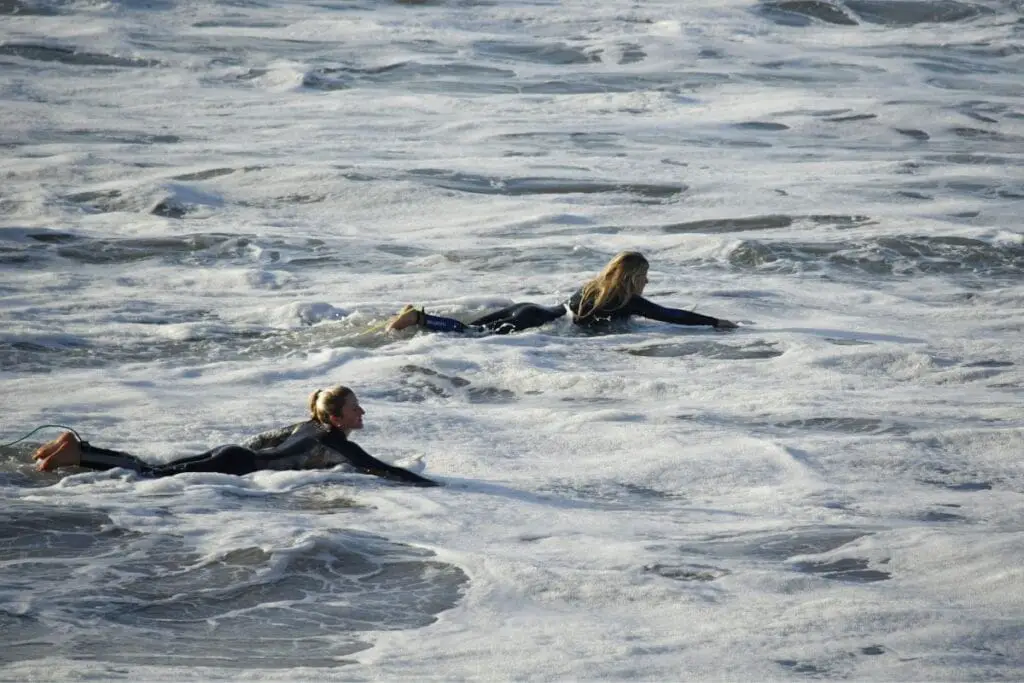
Before you even pick up a surfboard, you’ve got to be comfortable being in the water and the waves and it’s more important than what kind of board you choose.
In reality, if you are not a fair swimmer you might need to work on that. Swim in the ocean, in the waves, learn to body surf. This will dramatically help with how quickly you can take to surfing.
When you begin surfing, understanding your aquatic environment is critical. Knowing how tides and currents work and being able to read surf conditions will greatly enhance your safety and success in the water.
Tides and Currents
High tide and low tide affect the shape and the quality of waves at a surf spot. At high tide, the water is deeper, which can make waves break more gently—ideal for beginners.
Conversely, low tide often means shallower water and possibly more powerful and faster-breaking waves. To find tide information, you should check the local surf forecast before heading out.
Currents are continuous, directed movements of seawater generated by various factors, such as tides. Rip currents, which are powerful, narrow channels of fast-moving water, pose a significant risk to all surfers.
As a beginner, it’s important to learn how to:
- Identify rip currents by looking for water that appears darker and is moving away from shore.
- Avoid rip currents by checking with lifeguards and more experienced surfers, and by observing the water from the shore before entering.
Reading Surf Conditions
To select a beginner-friendly surf spot, learn to assess:
- Wave size: Opt for smaller, more manageable waves when you’re starting out.
- Wave shape: Look for waves that break softly, which are more forgiving than steep, fast-breaking waves.
- The lineup: Note how waves come in sets and understand the pauses in wave activity, known as lulls.
Always use a surf forecast service to gather information on the expected surf conditions, which usually includes wave height, wave period, wind direction, and tide times.
Remember, each day the ocean has a different rhythm, and being able to anticipate how the ocean will behave is key to picking the right time and place to surf.
2. Mastering the Basics, The Time & Effort Factors
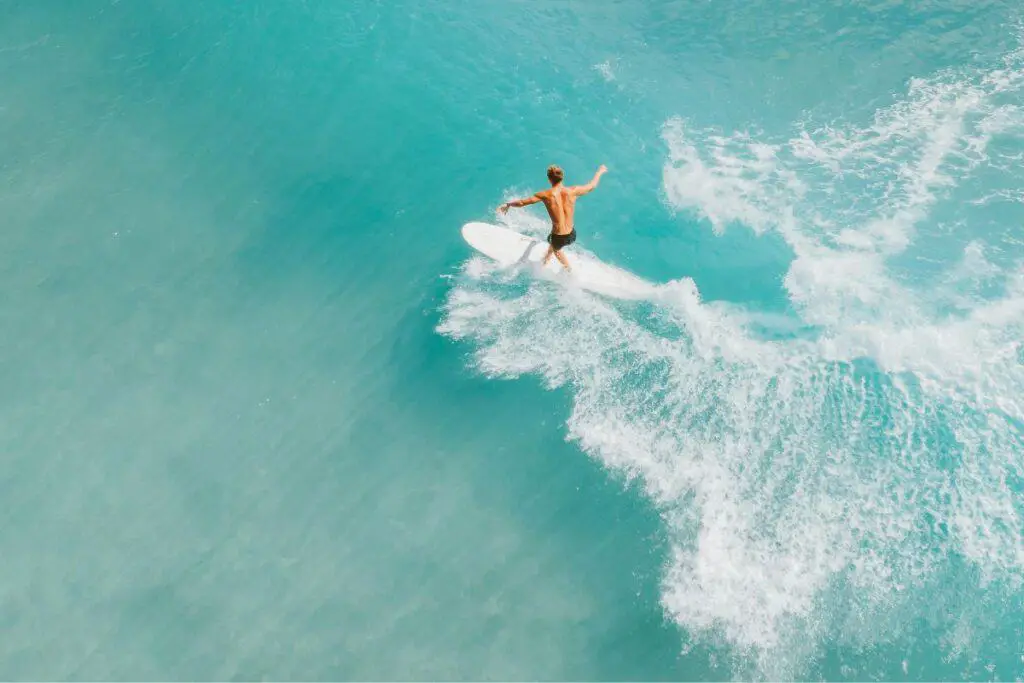
Before you can truly ride the waves with confidence, mastering two fundamental aspects—The Pop-Up Technique and Proper Surf Stance—is essential.
By focusing on these foundational skills, you’ll be better prepared to take on the challenges of surfing.
The Pop-Up Technique
When the wave approaches, it’s crucial to execute a swift and controlled pop-up. Start in the prone position on your board with your hands flat on the deck beside your pectorals.
Keep your fingers spread out for stability.
- With a strong paddle, gain momentum as the wave catches you.
- Push your chest up swiftly, extending your arms fully.
- Swing your feet under your body, placing your lead foot forward between your hands.
Remember that your first movements should be fluid and quick to catch the wave efficiently.
Proper Surf Stance
Once you pop up, achieve a proper surf stance to maintain balance and control:
- Feet: Place your feet shoulder-width apart, with your knees slightly bent.
- Weight Distribution: Spread out your weight evenly between both feet, while leaning slightly forward to maintain momentum.
- Arms: Keep your arms out for balance, with your front hand guiding direction and your back hand stabilizing.
- Eyes: Always look in the direction you want to travel.
Practice these stances on the ground before attempting them on water to build muscle memory.
Paddling Techniques
Once you actually get on a board the first thing you’ll need to master is simply gaining comfort paddling around on that surfboard, paddling out through waves, and that is purely a factor of time spent and experience gained in the water.
When beginning your surfing journey, mastering your paddling technique is essential. Effective paddling involves more than simple arm strength; it requires coordination, endurance, and the use of key muscles.
Correct Posture: Lay flat on your board with your body aligned. Your chest should be slightly lifted, which keeps the nose of the board from diving underwater.
Arm Motion: Paddle with one arm at a time in a smooth, alternating motion. Your hands should enter the water close to the board’s rails to maintain a streamlined position.
- Tip: Bend your arms slightly during each stroke to engage your biceps and back muscles.
Muscles Used: Paddling heavily involves the shoulders, back, and arms. Engaging your core will also help maintain balance and power through each stroke.
- Key Muscles:
- Latissimus dorsi (back)
- Deltoids (shoulders)
- Biceps and triceps (arms)
- Core muscles
Endurance and Cardio: Paddling builds cardiovascular health and endurance. To improve, consistently practice paddling during your sessions and consider cross-training exercises such as swimming.
- Cross-Training Benefits:
- Enhances cardiovascular stamina
- Develops relevant muscle groups
- Improves overall paddling endurance
Remember to keep your strokes long and deep to move efficiently through the water, and avoid paddling with both arms simultaneously as it can quickly lead to fatigue. As with any physical activity, ensure you warm up before getting into the water to minimize the risk of injury.
I don’t even want to think how long I spent paddling around in the surf before I was confidently surfing waves. It takes time! It’s getting to know the mechanics of waves and different spots and making incremental improvements. Once you start riding waves you need to keep doing that, hundreds and hundreds of times to refine your skills.
And that is probably the crux of learning to surf (or learning anything at all to a high level really). A commitment of time and effort. You won’t learn to surf in a day, or a week, or a month. You’ll learn over months and years of repetition and the more you put in the more you’ll get out.
3. Choose the right board to learn on (one that can float)
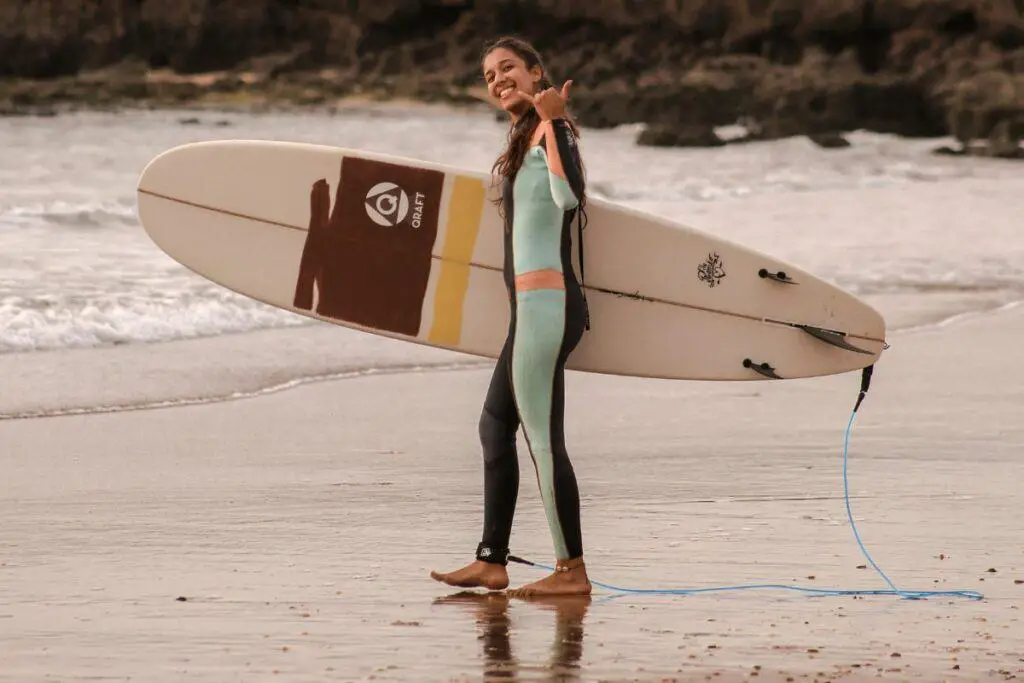
Selecting your first surfboard is essential to your surfing journey, considering factors like buoyancy, size, and board type to ensure a smooth learning experience.
Understanding Surfboard Types
Longboards: Ideal for beginners, longboards are typically 8 feet or longer. Their length and volume offer increased buoyancy and stability, making it easier for you to catch waves and stand up.
- Attributes:
- Greater surface area for better balance
- Thicker and wider for improved flotation
Shortboards: Shortboards are generally under 7 feet and are designed for more advanced maneuvers. As a beginner, you’ll find them challenging to learn on due to their reduced stability and buoyancy.
- Attributes:
- Sleek, narrow design for sharp turns
- Requires better wave timing and surfing skills

Factors for Selecting a Surfboard
Size and Volume:
- Heavier or taller surfers: Opt for a board with more volume for better support.
- Smaller surfers: Can manage with less volume but still prioritize a board that offers enough buoyancy for learning.
Board Features:
- Wax: Apply surf wax to your longboard or beginner surfboard for grip.
- Soft-top boards: These are often recommended for beginners due to their forgiving nature when wiping out.
Choosing a Spot:
- Beginner-friendly spots: Start at locations known for gentle, consistent waves and fewer crowds to practice with your new board.
When you’re ready to select your surfboard, focus on a longboard with ample volume and consider seeking advice from more experienced surfers to pinpoint the best fit for your specific needs.
There’s nothing more cringeworthy than a learner surfer trying to paddle around on a paddle pop stick sized surfboard that only a pro surfer could make look good.
Firstly you won’t be able to get anywhere paddling it and secondly, it will prove very difficult to catch waves. It’s a stereotype but a longer, more stable surfboard is going to make the above (getting comfortable in the water) much easier.
Not everyone wants to ride a long learner board and that’s fair enough. If you’ve got the swimming skills and feel like you can jump on something a bit smaller and less stable then there are plenty of options there for you, just don’t jump on a full on short board.
A higher volume board with more stability not only will be easier to try and learn on but you will learn the basics quicker and progress faster. Check out our articles: what size surfboard should I get?and Best Surfboards for Beginners (The Definitive Foam Surfboard Buyer Guide).
The other question that you will have is what type of surfboard you should get: fibreglass, epoxy, soft top…there’s many variations of surfboard construction.
Here at Get Foamie we are obviously big fans of softboards and for many reasons. For learners, we think they are by far the best choice. They’re high volume, light and less dangerous than other boards.
4. Find an appropriate surf spot
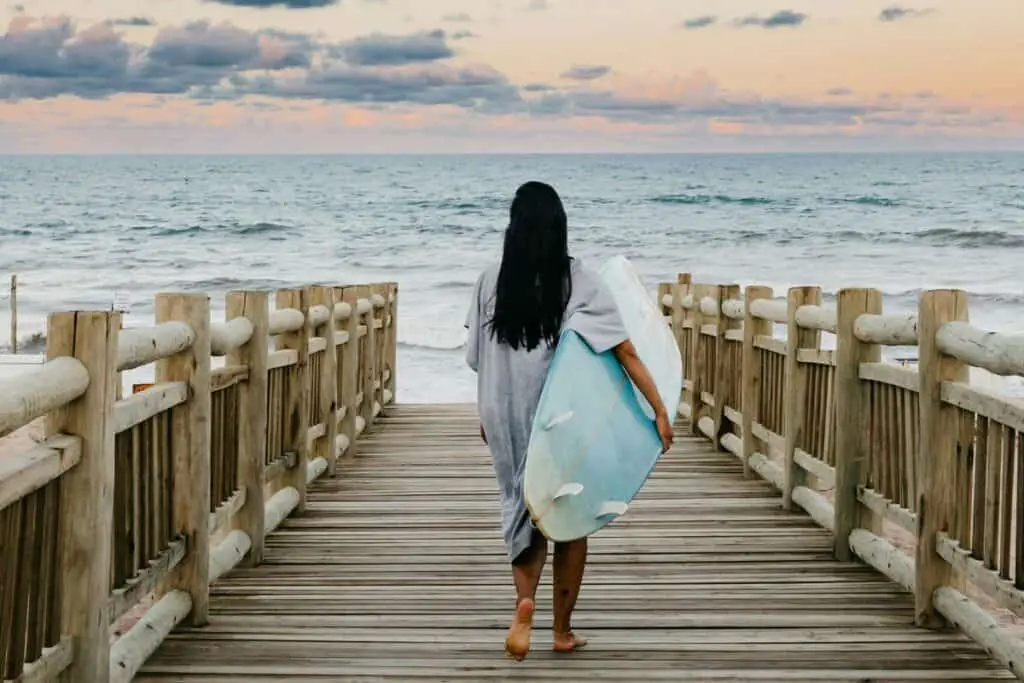
Don’t go to the most popular crowded surfspot filled with experienced surfers and great waves. You’ll get the stink eye, you’ll get in people’s way and probably won’t have the best time!
When you are learning to surf you need to catch as many waves as you can and they don’t need to be amazing so there’s no point to try and surf at the most popular spot. It’s all about quantity over quality of waves at this stage of your surfing career. You need small waves with limited crowds.
5. Find someone you can learn from

When you are starting out, if you can have someone who knows what they are doing show you the ropes that will really help.
If you don’t have any friends or family who could give you some pointers I would suggest taking a few surf lessons. That will help you to get the basics, point you in the right direction and once you have a feeling for it you can practice on your own from there.
Once you start surfing more confidently, your learning can really be boosted by surfing with a friend who is better than you. At the beginning you are having to concentrate so hard on the simplest part of surfing – when you get past that you can start tweaking things little by little and improving your technique.
It took me a long while to go from beginner to intermediate and the best thing I ever did for improving my surfing was regularly surfing with a group of surfers who were better than me.
Surround yourself with surfers who have a higher skill level, as their experience is an invaluable resource. Observing and emulating their techniques can significantly accelerate your learning curve.
To maximize the benefits:
- Seek Guidance: Engage with more experienced surfers or take lessons. They can provide tailored advice to rectify your mistakes.
- Watch and Reflect: Spend time watching others surf. Take note of their stance, timing, and wave selection.
- Practice Regularly: Experience comes from repeated practice. The more time you spend in the water applying what you’ve learned, the quicker you’ll progress.
Always remember that progress in surfing is a blend of fitness and continuous learning. With dedication to both, you will steadily see improvement in your skills.
Bonus Tips

As I mentioned before, once you get started and if you really want to improve your surfing it’s about time spent in the water and time catching waves over and over again.
Improving and Progressing Repeat, Rinse, Repeat
One of my surfing buddies started surfing in his mid to late 30’s.
When he started he was so goofy and everyone had to laugh at him in the water but the one thing was clear – he had caught the surfing bug. From those early days he surfed whenever he could.
Living an hour from the closest beach he would leave the city at 3am almost every weekend, sometimes for early sessions before work during the week consistently for years.
Some people thought he was crazy but his surfing got better and better. Here we are almost 10 years later and he is a great surfer still with as much passion for surfing as a 10 year old grommet!
You may not be able to surf every day or even every week but you can still make the most of it and if you put the time in, you will learn to surf!
Progress in surfing hinges on both your fitness level and the quality of learning experiences. Regardless of your age or surfing tenure, these factors are pivotal in enhancing your abilities on the waves.
To advance in surfing, you need to develop specific physical abilities. Greater strength translates to more control over your board and the capacity to tackle more challenging waves.
Focus on exercises that emulate the movements of surfing to improve your fitness:
- Cardiovascular Training: Start with swimming to boost your endurance, closely mimicking the aerobic demands of surfing.
- Core Exercises: A strong core stabilizes your body on the board. Incorporate planks and yoga to build core strength.
- Upper Body Workouts: Paddling requires significant arm strength. Push-ups and pull-ups can enhance upper body strength.
- Balance Training: Utilize a balance board or surf skate to replicate surfing’s balance component, which is crucial for standing and maneuvering on the board.
Managing Common Mistakes
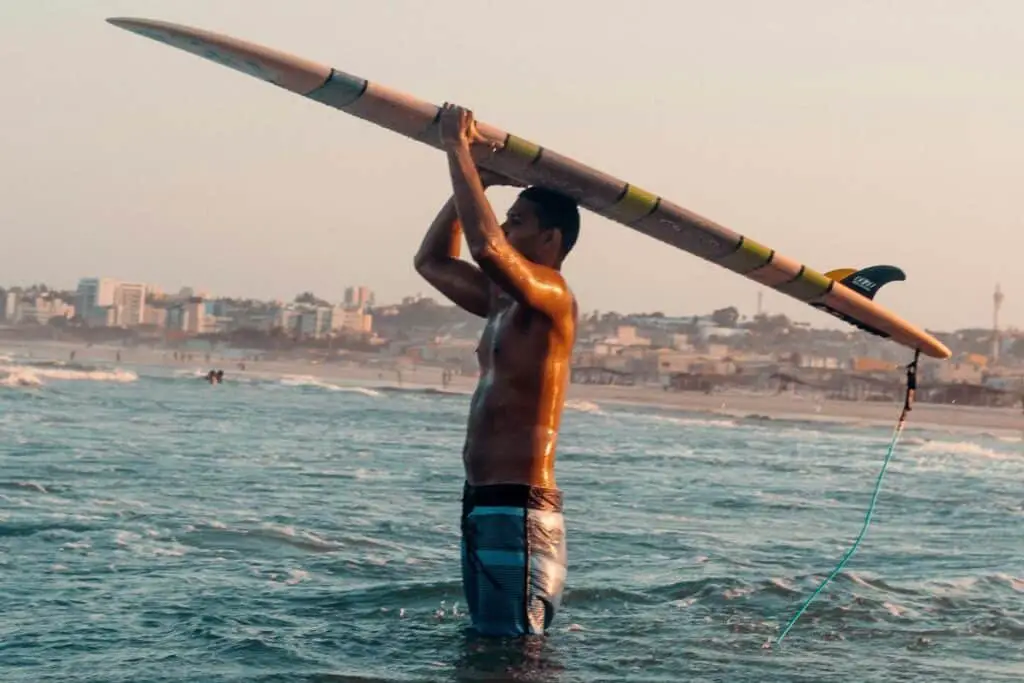
Many beginners experience common issues when learning to catch waves.
Here’s how to handle them:
- Bogging: If your surfboard’s tail presses down too much, causing drag, ensure your weight is not too far back on the board. Keep your body centered.
- Pearling: This happens when the nose of the board plunges underwater and can cause you to wipe out. To avoid this, make sure you’re not too far forward on the board.
- Wiping out: It’s part of the learning process. Always cover your head with your arms when you fall to avoid injury, and fall flat to disperse the impact.
- Shore break awareness: Be cautious of waves that break too close to the shore to prevent injuries.
Remember to always bend your knees when you stand up on a wave for better balance and control. It helps lower your center of gravity and improves your ability to ride the wave successfully.
Acquiring the feel of the wave is a matter of practice. Pay attention to your body’s positioning, listen to the rhythm of the ocean, and persevere. With time, catching waves will become second nature.
Surfing Safety and Etiquette
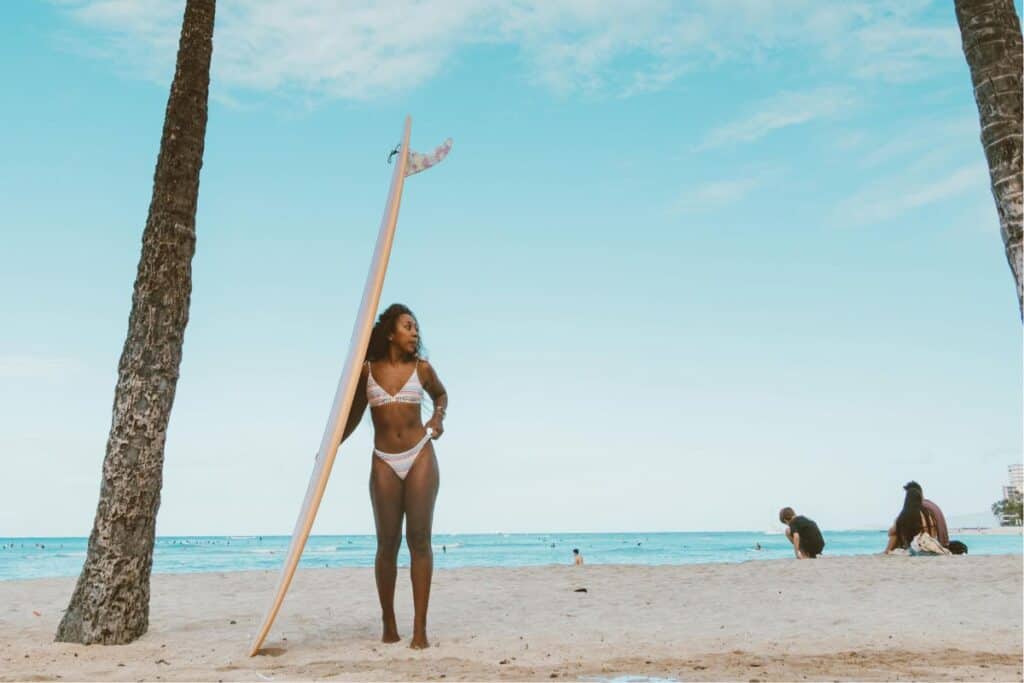
Before paddling out, it’s essential to familiarize yourself with fundamental surfing rules and injury prevention techniques to ensure both your safety and the safety of others in the water.
Understanding Surfing Rules
Right of Way: The surfer closest to the peak of the forming wave has priority. If someone is already on the wave, wait for the next one.
Leash Use: Always wear a surf leash to prevent your board from getting away and posing a danger to others.
Respecting Locals and Lifeguards: Pay attention to any advice from locals and lifeguards. They know the area and can help you avoid hazards.
- Lifeguard Presence: Surf in areas where lifeguards are present, which ensures quick assistance in case of an emergency.
- Do Not Drop In or Snake: Cutting in front of someone already riding a wave (dropping in) or paddling around someone to catch a wave (snaking) is considered impolite and hazardous.
- Communication: Signal your intentions and communicate with other surfers to avoid collisions.
Preventing Injuries
Choosing the Right Equipment:
- Board:
- Begin with a longer, wider board for stability.
- Ensure it’s suitable for your skill level.
Safe Surf Practices:
- Observe and Learn:
- Spend time watching the waves and other surfers before getting in the water.
- Environmental Conditions:
- Check the weather and tide information.
- Choose beaches with conditions appropriate for your skill level, ideally with a sandy bottom and minimal rip currents.
- Warm-Up:
- Perform warm-up exercises to reduce the risk of muscle strains or other injuries.
- Learn to Fall:
- Practice falling away from your board to avoid injury.
- Continual Awareness:
- Stay alert to the conditions around you, including other surfers, wildlife, and changing weather patterns.
Preparing for the Waves
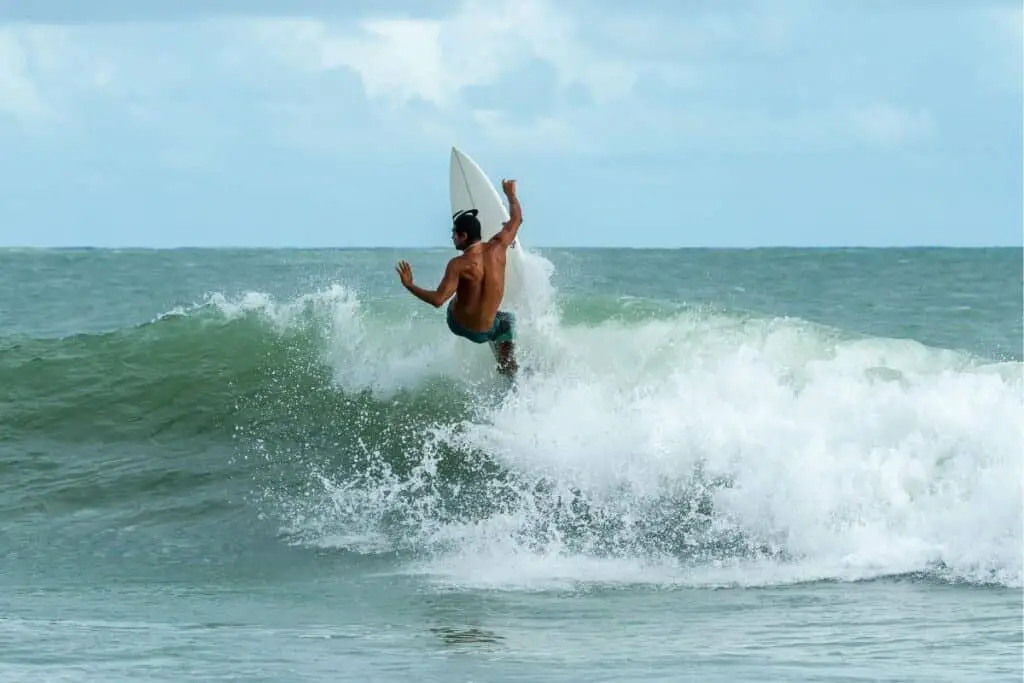
Before you head out to conquer the surf, it’s crucial that you prepare both your body and equipment.
This preparation ensures safety, enhances your performance, and contributes to an enjoyable surfing experience.
Importance of Warming Up
Warming up your muscles through dynamic stretching is essential to prevent injuries and improve your flexibility in the water.
Try a routine that includes:
- Jogging on the sand for 5-10 minutes to increase your heart rate.
- Dynamic stretches such as leg swings, arm circles, and hip rotations for at least 10 minutes.
Warming up isn’t just about physical readiness; it’s also a chance to mentally focus on the surf ahead.
Choosing Appropriate Gear
Your gear is your ally in the waves, so select it wisely to match the conditions and your skill level.
- Wetsuit: Necessary for colder water, it provides insulation that allows you to surf for longer periods. Ensure it fits snugly without restricting movement.
- Swimsuit/Boardshorts: In warmer climates, a comfortable swimsuit or boardshorts suitable for active movement will suffice.
- Surfboard: As a beginner, opt for a larger board with more volume and stability. Foam boards (soft tops) are often recommended to start.
Remember, your comfort and safety in the water are paramount, and the right kit can make all the difference.
Catching Your First Waves
Catching your first waves is a thrilling milestone in your surfing journey. Key to success is understanding the right positioning and timing, and learning how to manage common mistakes that could lead to wiping out.
Positioning and Timing
Positioning yourself correctly is crucial for catching a wave. Start in whitewater, where the waves have already broken, to practice your timing and popping up on the board.
Align yourself so you are perpendicular to the incoming waves and paddle hard as the wave approaches.
Paddle technique:
- Keep your arms strong and your strokes deep.
- Aim for a steady and consistent pace.
Board position:
- Lie with your body centered on the board to keep it level.
- Your feet should not hang off the end, to avoid pearling, where the nose of the board digs into the water.
As you grow more confident, move to unbroken waves, watching the peak, or highest point, to anticipate the wave’s break. Wait for the wave to reach you; too early and you’ll miss it, too late and it will break before you catch it.
Frequently Asked Questions
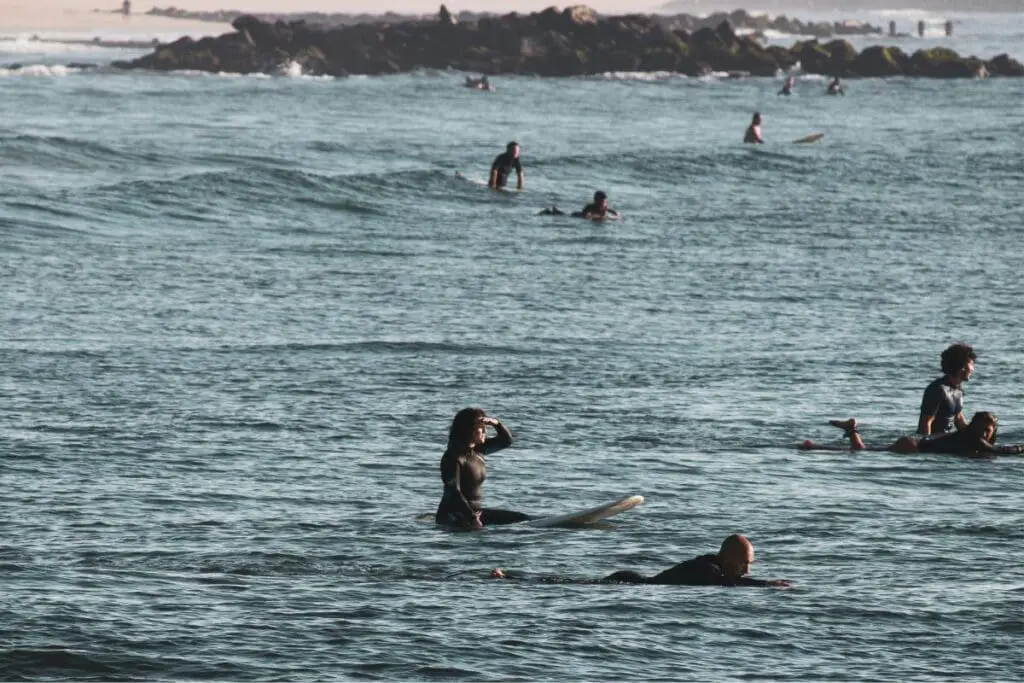
In this section, you’ll find concise answers to some common questions that beginner surfers often have. These will help you understand the basics and improve your skills on the waves.
How can a beginner improve their surfing skills?
To enhance your surfing abilities, consistently practice in beginner-friendly spots with gentle waves. Focus on your stance, balance, and wave reading skills. Consider lessons from experienced instructors to accelerate your learning curve.
What are the fundamental techniques for popping up on a surfboard?
The pop-up technique is essential for catching waves. Start lying flat on your board with hands placed near your chest. In one swift motion, push your upper body up and bring your feet under you, assuming a stable standing position while keeping your knees bent.
What common mistakes should a beginner surfer avoid?
Beginners should avoid paddling with only their arms instead of their entire upper body, choosing the wrong surfboard type, surfing in conditions beyond their skill level, and neglecting to observe surfing etiquette and safety measures.
Can someone learn to surf on their own, and if so, how?
Yes, you can learn to surf on your own by starting with small, manageable waves and using a suitable beginner surfboard. However, self-teaching can be challenging, so consider watching online tutorials or reading guides to understand the basics before getting in the water.
At what age is it too late to start learning to surf?
It is never too late to begin surfing as long as you’re in good health and capable of swimming in the ocean. Older beginners should focus on their fitness level and consult a doctor before starting.
What are some tips for making the transition from beginner to intermediate surfer?
To progress from a beginner to an intermediate surfer, practice regularly, observe and learn from more experienced surfers, refine your techniques for paddling, positioning, and wave timing, and slowly challenge yourself with larger waves and different surf spots.

